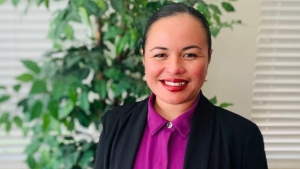
A new partnership aims to provide students with real-world training while strengthening University of Hawaiʻi’s research enterprise as a major economic and intellectual driver for the state.
New UH partnership to aid national security, boost state’s economy
UH News, March 17, 2021
UH has teamed up with the National Security Innovation Network (NSIN) to help build innovators who generate new solutions to national security problems in the U.S. UH joined 25 educational institutions nationwide participating in the program, a list that includes engineering powerhouses such as the Georgia Institute of Technology and University of California, Berkeley.
NSIN Hacking for Defense program
The U.S. Department of Defense (DoD) has identified engineering-related issues that are being solved by UH Mānoa College of Engineering students through a program called “Hacking for Defense” (H4D). The spring 2021 course is taught by Marvin Young, a UH Mānoa mechanical engineering adjunct professor; and Denise McKenzie, an adjunct professor with the National Science Foundation I-Corps program. Students are developing minimum viable products to address existing issues in national security. If successful, early prototypes can be designated for further research and development. The inaugural class has 11 students.
“Our goals for ‘ME 491: Hacking for Defense: Solving the Nation’s Foreign Policy Issues Utilizing the Lean Launchpad Methodology’ are: solve real-world problems, create technology solutions, understand the stakeholders and costs, deliver viable products and produce a repeatable model,” Young said.
“With today’s constantly evolving threat environment to our national security, NSIN’s Hacking for Defense program to tap the young and innovative minds of our students makes a lot of sense,” said UH Mānoa College of Engineering Dean Brennon Morioka. “This new partnership also represents the continued expansion of our long-standing working relationships with numerous DoD entities, both on the local and national levels.”
Plans are being made to expand the H4D program into a multidisciplinary course in fall 2021 that will include the UH Mānoa Department of Information and Computer Sciences and Shidler College of Business. The NSIN Hacking for Defense program is powered by BMNT Inc., and the Common Mission Project.
NSIN X-Force program

Lauren Ward
The NSIN X-Force Fellowship program is an opportunity for technologists and entrepreneurs to solve real-world national security problems in collaboration with the military. The program is a full-time, in-person paid summer program at a military installation or military sponsor location. Fellows are paid a stipend of around $2,500 per month and have a small budget for materials and other expenses. Seven UH students participated in the inaugural 2020 X-Force program, including UH Mānoa Earth sciences PhD student Lauren Ward, who partnered with a team to develop a 3D mapping object detection and integration prototype for the U.S. Army. Applications for the summer 2022 program will be accepted in late 2021.
“My experience with the X-Force program was very positive. I would recommend the program to any student looking to gain work experience outside academia before they graduate. Along with the opportunity to work on cutting edge real-world problems that the U.S. military faces, the program is very focused on networking and future career opportunities,” Ward said.
New NSIN university program director

Gloria Choo
As part of its commitment to UH, NSIN has announced the selection of its inaugural university program director at UH. Gloria Choo, a UH Mānoa alumna, brings more than 15 years of experience from the Hawaiʻi Air National Guard and the U.S. Indo-Pacific Command to leverage the skills and talents at UH to help solve DoD’s most pressing problems. Choo will manage defense-related innovation outreach and ecosystem development for UH and the state of Hawaiʻi.
“Being from Hawaiʻi I am excited to show students and faculty the opportunities the Department of Defense brings in terms of careers, fellowships and entrepreneurship,” Choo said. “UH Mānoa has tremendous strengths in many areas relevant to DoD priorities, and NSIN enhances these opportunities. NSIN programs allow students to connect with real world DoD problems through sponsors and mentors and to learn the value of looking at all facets of a problem and effectively reaching a solution.”
“As NSIN expands its problem-solving network on behalf of the Department of Defense, UH‘s incredible talent and deep commitment to national security will be tremendous assets,” said Jesse Gipe, NSIN Pacific-South Regional Director. “Situated near some of our nation’s most strategic military commands, UH, in partnership with Gloria, will work together to build more rapid problem-solving capacity to address our military’s pressing problems.”
Other opportunities
The NSIN program is housed in the UH Office of Innovation and Commercialization (OIC) and is one of several programs designed to elevate the research, innovation and entrepreneurship created throughout the 10-campus UH System. OIC helps UH researchers, staff, faculty and students: identify, protect and commercialize innovative intellectual property; foster innovation and entrepreneurship through its programs; and improve access to strategic grants. In addition, OIC is committed to developing and fostering long-term public-private partnerships. Other programs include: Hacking 4 Recovery, Hacking 4 Oceans, Innovation Impact Challenge, Small Business Innovation Research and Small Business Technology Transfer, Hawaiʻi Tech Bridge, (K)new Futures and Medical Innovation and Design (MIND) Hawaiʻi.
“The NSIN programs along with the others from OIC, are all part of UH’s strategy of identifying, protecting and commercializing innovative intellectual property; fostering innovation and entrepreneurship; and building the pipeline of dual use, high growth and deep technology ventures” said UH OIC Interim Director Steve Auerbach. “What we hope to achieve is the creation of more local businesses and more jobs that will lead to a more resilient, sustainable and diversified economy for Hawaiʻi.”
For more information, visit OIC’s website.
This effort is an example of UH Mānoa’s goal of Excellence in Research: Advancing the Research and Creative Work Enterprise (PDF), one of four goals identified in the 2015–25 Strategic Plan (PDF), updated in December 2020.